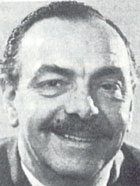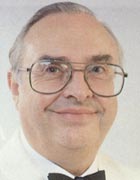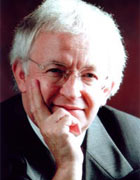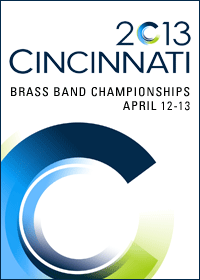Time Team - January 2009
7-Jan-200940 years ago a seismic change occurred in the banding world - Spectrum had arrived by the man who changed all our thinking on test pieces for brass bands.
 With the brass band world paying homage to Gilbert Vinter in a couple of weeks time at the RNCM Festival of Brass, it is easy to forget that 40 years ago this year his most contentious work for the medium wasn’t quite received with such unbridled enthusiasm.
With the brass band world paying homage to Gilbert Vinter in a couple of weeks time at the RNCM Festival of Brass, it is easy to forget that 40 years ago this year his most contentious work for the medium wasn’t quite received with such unbridled enthusiasm.
The announcement that ‘Spectrum’ was to be used as the set work for the 1969 British Open Championships was made at that year’s Spring Festival, held in Belle Vue, Manchester.
General approval
Jack Fearnley, the General Manager at Belle Vue made the announcement from the stage, to general approval of those in the audience – and the press.
British Bandsman reported: “There will be general approval and enthusiasm for the news that the British Open has again inspired another major work from a composer of outstanding gifts.”
The previous year Vinter’s ‘John O’ Gaunt’ had been used at the contest, and although not a work that the composer himself felt was one of his best, it had appealed to the conservative tastes of a banding movement that was moving slowly into a new age of composition.
Monochrome
The 1960’s were still monochrome times in terms of test piece output – especially at Belle Vue. The preceding years at the British Open had seen a regurgitation of old classics, such as ‘Lorenzo’, ‘Downland Suite’, Life Divine’, ‘Saga of the North’, and ‘Comedy Overture’ – not exactly the ground breaking repertoire to set alight the burning flames of innovation.
At the same time ‘Spectrum’ was being announced as the new test piece for the Open, the bands at the 1969 Grand Shield had just tried to win their place at the contest by playing ‘Peddar’s Way’ by Kenneth Wright, whilst ‘Coriolanus’ was used for the Senior Cup and ‘City by the Sea’ for the Senior Trophy.
Slightly different
The Nationals were slightly different though (although only slightly) – Vinter himself had produced ‘Variations on a Ninth’ and ‘Triumphant Rhapsody’ for the Finals of 1964 and 1965 respectively, whilst a new composition (although from a very tried and tested source in Eric Ball) had been used in 1967.
This was the world into which ‘Spectrum’ was about to be unleashed
Vinter himself had not been well for some time in 1969, and it was reported that doctors had informed him that he had to withdraw from activities during June – a situation that led to him being unable to adjudicate at the Bugle Contest. What was to come would test his resolve even further.
By the end of June scores of ‘Spectrum’ were being produced by Studio Music and the first tickets for the British Open were on sale at 10/6, 8/6, 7/6 and 6/- from Belle Vue itself – the contest due to be held on the 6th September.
Bolt of lightening
Then came the decision that struck the banding world like a bolt of lightening.
On the 9th August 1969, it was reported that the decision to include percussion players in performances at the British Open had been made. “That the oldest of all the brass band contesting centres has shown this early realisation is indeed cause for celebration,” said British Bandsman.
The ‘momentous’ decision was relayed by Jack Fearnley, who pointed out that up to two players could be used to play the parts required.
Bands who had already started work on the piece therefore had to start getting used to hearing bongos, claves, wood block, tambourine, triangle cymbals as well as the usual side and bass drum.
Colourful music
The list of 21 competing bands was published, and as British Bandsman remarked, “…The music is colourful, as befits the title; the musical and technical demands will test all who perform it. At the same time it is music essentially conceived in terms of a brass band, exploring the tonal beauties of the band.”
 Today, as Dr Roy Newsome (right) states in his book ‘The Modern Brass Band’ – ‘Spectrum’, may now seem tame in comparison to the works bands play today. However as he says: “Though not making excessive percussion demands…a performance without percussion is lamentably incomplete.”
Today, as Dr Roy Newsome (right) states in his book ‘The Modern Brass Band’ – ‘Spectrum’, may now seem tame in comparison to the works bands play today. However as he says: “Though not making excessive percussion demands…a performance without percussion is lamentably incomplete.”
Cinderella
A correspondent to British Bandsman also wrote: “There still remains the possibility of percussion being the Cinderella, rather than an integral part of the brass band. Apathy can only fortify the anti percussion prejudice which has plagued brass bands for so long.”
Other changes had to be made to, with reports of the stage at Belle Vue being lowered in height and an extension added to give percussionists room to play. Bands were allowed to play their own percussion instruments and ‘assistants’ were employed to help the players get the instruments on and off the stage (a problem that led to Black Dyke having to replace the Templemore Band in the draw after they had mislaid theirs).
Resentment
By the time the contest came around, reports of some well known conductors and bandsmasters threatening to boycott the contest as the piece was too difficult never quite materialised, although resentment still simmered beneath many a bandroom surface.
The contest itself was won by Grimethorpe Colliery Band conducted by George Thompson, with Carlton Main second, two points behind, and with CWS Manchester in third, after they had given the premiere performance of ‘Spectrum’ off the number 1 draw earlier in the day.
Tremendous impact
Thompson later told Arthur R Taylor in his book ‘Labour & Love’: “’Spectrum’ had a tremendous impact on me. It did present problems, but it had a melody and a meaning behind it all – in spite of the little rhythmic difficulties. There was a pattern to the music – a message.”
Arthur Taylor’s book ‘Brass Bands’ however, perhaps pinpointed the problem that the conservative thinkers who held sway in the banding movement at the time, probably felt: “’Spectrum’ was too difficult, too complicated, too modern – anarchical, almost. The world was coming to an end and there were conductors who threatened never to return to Belle Vue ‘unless the music was improved.’
Former player Les Beevers remarked: “”Spectrum’ was a wonderful piece I thought, but it didn’t half cause convulsions in some quarters.”
The man who changed all our thinking
 However, some important future innovators, such as composer, Edward Gregson (right) was enthused. “I thought Vinter an interesting composer, if a somewhat uneven one. I though him a marvellous scorer. In fact the more I think about it, maybe he was the man who changed all our thinking."
However, some important future innovators, such as composer, Edward Gregson (right) was enthused. “I thought Vinter an interesting composer, if a somewhat uneven one. I though him a marvellous scorer. In fact the more I think about it, maybe he was the man who changed all our thinking."
It had indeed, and some years later, Paul Hindmarsh wrote: “It is the variety of harmonic colour, the syncopated rhythms, and the range of instrumental effects, allied to the organic strength of the structure in ‘Spectrum’ that have made perhaps the strongest, most lasting impression.”
Illness
Unfortunately Gilbert Vinter was prevented from attending he contest due to further ill health and his place in the box was taken by Eric Ball with fellow judges Sir Vivian Dunn and John Carr.
It was said that Vinter, a deeply sensitive and thoughtful man was deeply hurt by the ‘storm that had burst over his head’.
However, after the contest, British Bandsman stated that ‘The comments (on percussion) were many and varied. There is no doubt that the significance is considerable. It is certain that a changed attitude to the importance of percussion instruments will enter into the thinking of those who write and arrange music for brass bands.”
So far behind
As Arthur Taylor stated in his own conclusion: “Today, one wonders what all the fuss was about. ‘Spectrum’ has passed almost into the mainstream of brass band contesting.”
A sympathetic fellow composer was said to have remarked: “It wasn’t so much that Vinter was ahead of his time, it was just that brass bands were so far behind.”
Gilbert Vinter died on Friday 10th October 1969. It was written: “His music will sound out throughout the world for years to come.”
Harry Mortimer paid the tribute: “Here, then, was the complete musician – talented player, fine conductor and adjudicator, and composer of such forward thinking merit that not only we in the brass band world, but music generally, will be much the poorer for his passing.”
All this – just 40 years ago.




